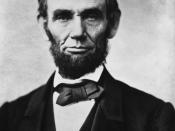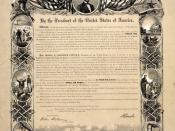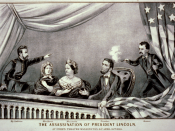Emancipation Proclamation Until the actual start of the Civil War, the ongoing debate between abolitionists and proslavery leaders seemed almost theoretical. The war simply added to the fire and passion of the debate and made it into a bitter struggle between enemies. In 1861, Abraham Lincoln gave his inaugural address. In order to win over the public he pledged not to interpose with the issue of slavery, however, Lincoln was a principled abolitionist. It can be resolved that he was pressured from all angles, but Lincoln was not forced to issue the Emancipation Proclamation.
Despite his despise of slavery, he was not free from prejudice, but he did not oppose the freedom of the black people.
The beginning of the Civil War marked an objective not originally to free the slaves, but to merely preserve the union. Lincoln's original goal was simply to save the country. He outwardly proclaimed, as did Congress, that he had no intention of defeating previously established institutions.
As Congress and President Lincoln continued to deny that they will emancipate the slaves, the certitude still remains that everyone in this divided country is calling for something to be done concerning slavery. The government attempted to avoid the issue of slavery and Lincoln strive to keep focus on preserving the union took away from the issue. Nevertheless the extensive indications of the war for slavery could not be ignored. The immense pressure of the war was the driving force for the question of slavery to be even recognized.
In 1861, slaves were being considered for more than just being freed for moral purposes. Their freedom was being taken into account for military use. At this time in the war, slaves were being used to benefit the confederate cause. They were being utilized to fight for the...



Good
Not bad, and has a few references.
0 out of 0 people found this comment useful.